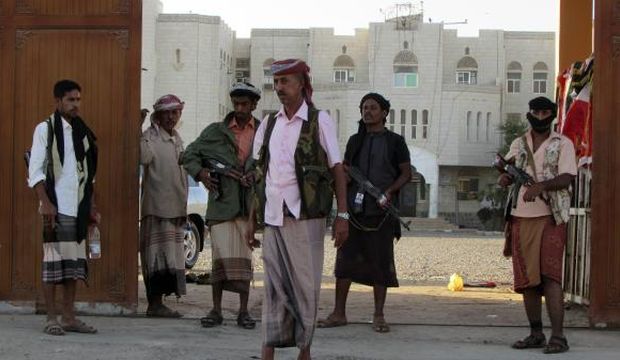
Armed men stand guard outside a local authority compound after taking it over in Yemen’s southern port city of Aden, on February 16, 2015. (Reuters/Yaser Hasan)
Sana’a and Aden, Asharq Al-Awsat—The Shi’ite Houthi movement in de facto control of Yemen rejected on Monday calls from the United Nations demanding it give up power in the country.
The UN Security Council said on Sunday it “deplored” the Houthi takeover of Yemen’s central government, and passed a unanimous resolution calling on the movement to “immediately and unconditionally” withdraw from the government and security facilities it is currently occupying in the capital Sana’a and other areas of Yemen.
A statement from the movement on Monday, however, said it was “astonished” by the Council’s resolution, and asked it not to interfere in Yemen’s sovereign affairs and to “respect the will of the Yemeni people.”
The Council’s decision came following calls from the six-member Gulf Cooperation Council (GCC) asking the UN to take serious action on Yemen in accordance with Chapter Seven of the UN Charter—which allows for the use of military force or sanctions in the event of “any threat to the peace, breach of the peace, or act of aggression.”
The Houthi movement said in its statement it found the Gulf stance toward its recent moves—which it referred to as a “revolution”—“incredibly strange” and said the GCC countries were as a result “targeting the Yemeni people without any justification.”
“We call on our brothers in the GCC to reassess their positions with respect to the Yemeni people and their just revolution whose aim is to correct the country’s political course and fill the power vacuum that resulted from the resignation of the president of the republic and the government,” the statement said.
Yemen’s outgoing president Abd Rabbuh Mansur Hadi and the government headed by Khaled Bahah resigned on January 22 after armed members of the Houthi movement surrounded Hadi’s home, effectively placing him under house arrest, where he remains until now.
Volunteer groups in the country’s south loyal to Hadi clashed with security forces in the port city of Aden on Monday. One member of the security forces and three others were reported killed, with scores more injured or taken hostage by either side.
The volunteer groups—affiliated with Yemen’s southern secessionist movement Al-Hirak—say the security personnel were part of the newly created Special Forces—formerly the Central Security Forces—and are headed by Abdul Hafiz Al-Saqqaf, a Houthi loyalist.
A volunteer from one of the groups stationed at Aden’s airport told Asharq Al-Awsat the clashes began on Sunday evening, when the Special Forces attacked a building used by the volunteers.
Meanwhile, on Monday the Houthi movement announced the makeup of its “Revolutionary Council,” the body it is setting up to help form the country’s new government and oversee its political transition.
The Shi’ite movement, also known as Ansar Allah, occupied Sana’a in September, when the movement’s members flooded the streets of the capital for a month-long series of mass protests and sit-ins. This was followed by Houthi members spreading across the capital and taking control of government and military buildings and installations.
The movement then signed a Peace and Partnership agreement with Hadi, which met Houthi demands for a new government but also stipulated the movement withdraw from all government and military institutions it was occupying and hand over any weapons seized back to the state.
However, despite signing the agreement, Houthi fighters continued their advance across Sana’a and throughout the rest of the country, often clashing with local tribal groups.
Many in Yemen and the region believe the Houthis are being supported by Shi’ite Iran and have allied themselves with former president Ali Abdullah Saleh, further stoking sectarian and political tensions in the country.
Saleh, who was ousted following widespread protests against his rule in 2011, reportedly has numerous followers and loyalists among Yemen’s political class and security services, who have aided the Houthis’ latest moves to seize power in the country.
Mohamed Al-Hashimi contributed additional reporting from Aden.
